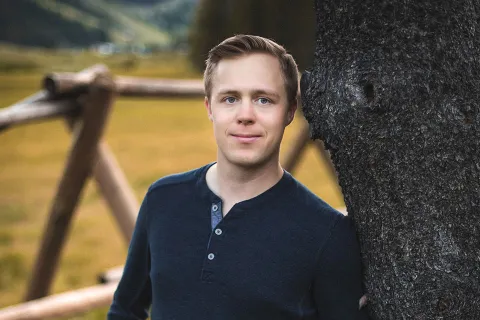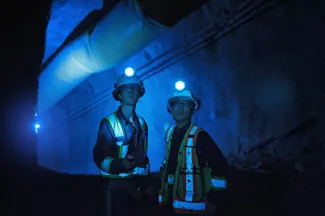“Commit yourself to lifelong learning. The most valuable asset you will ever have is your mind and what you put into it.”

Tenaya Brown
- Degree:
- Master of Engineering
- Grad year: 2022
- Program:
- Campus: Vancouver
I completed my bachelor’s degree in Geological Engineering from the University of Nevada, Reno and recently completed the Graduate Certificate in Global Mine Waste Management and my Master of Engineering in Mining Engineering at UBC under the supervision of Dr. Caius Priscu. My Master’s project focused on creating a complete framework and guidance document for authoring Deviance Accountability Reports, which are a new and innovative component of tailings management leading practice in the mining industry. The project has been submitted for consideration to be presented at the 2022 Tailings and Mine Waste Conference. Outside of academia, I have spent the past four years, including my time as a graduate student at UBC, working as a geotechnical and mine waste consultant for a well-known international consulting firm. Upon graduation from the M.Eng program, I will take a new role doing dam safety for a large diversified natural resource company.
Why did you choose to go into your field of study at UBC?
I chose to attend UBC because I was interested in Mine Waste Management from my undergraduate training in Geological Engineering and my work experience in consulting. UBC offered the first fully accredited Graduate Certificate in Global Mine Waste Management and the potential to take that coursework into an M.Eng degree while working full time. I correctly perceived the program to be innovative in a manner that exposes students to leading practices in my profession. The ability to learn from world renowned mine waste management specialists Dr. Dirk van Zyl and Dr. Caius Priscu also played a significant role in my decision to undertake graduate education at UBC. I also knew the programs would be particularly relevant to my long-term professional development.
What has made your time at UBC memorable?
Outside of the relevance and applicability of my course material, there was one moment in particular that validated my decision to enroll in the M.Eng program. This moment occurred in MINE 555 (Mining and Society) taught by Dr. Jocelyn Fraser, during a group project at the end of the semester. The group chose to assess mining conflict between a mining company, the government, and the surrounding Indigenous communities at a large copper mine in Peru. During a deep dive into the substantive components of the conflict, I developed a greater understanding of how mining can have a negative impact on communities. Furthermore, it illustrated the importance of adopting collaborative approaches to mining and community engagement that generate shared value through the process of consultation. Operations have been shut down at the mine frequently due to the conflict. When operating at full capacity, the mine produces nearly 2% of the world’s newly mined copper. However, the shutdowns have led to decreased production and major cost overruns. Throughout the course of the project were able to discuss the myriad of issues and ultimately, suggest potential resolutions to the conflict. While it was a purely theoretical exercise, it demonstrated the potential value of the learning environment we were in. I was also duly impressed by my group members and their passions for continuous improvement and the cultivation of adaptable systems-based thinking.
Tell us about your experience in your program. What have you learned that is most valuable?
While I would not call it unexpected, the most valuable skillset I obtained from my time at UBC was the ability to understand and articulate the complexity and risk related to the mining industry and tailings specifically at a much more advanced level. Many of these skills were further complemented by directly applying the concepts we learned to cutting edge, industry leading guidance such as the Global Industry Standard on Tailings Management (GISTM).
How are you applying the skills you learned through your studies at UBC?
The skills I learned have been useful since day one of the program. I worked full time as a Geotechnical and Mine Waste Consultant throughout my program of study. I was able to immediately apply my newly acquired skills in tailings management to my everyday roles and responsibilities. Due to my newly attained knowledge, I was able to take on projects with increased technical complexity and gain more exposure to project management from project conception to completion. Post-graduation, I have pivoted out of consulting and into dam safety for a large natural resources company. Without going through the M.Eng program, I would likely have not pursued this opportunity or even have been aware of its existence. The new skills I have acquired will be used in my new role on and an everyday basis.
What advice would you give a student entering your degree program?
Challenge yourself to think outside the box, check the facts, question the status quo, and above all, embrace complexity and uncertainty. Graduate school is what you make of it and it should be about what you learn and how you will apply it outside of the classroom upon graduation. On another more personal note, the importance of networking cannot be understated. Practice your soft skills by getting to know your professors and classmates because you will likely cross paths with all of them again and again. I would particularly encourage all students to connect with and learn from those hailing from different cultural, ethnic, socio-economic, and professional backgrounds. I think that by doing so personal growth and technical skillsets can be truly optimized.
What are your future plans to make a difference in our world?
Historically, there has been a lack of emphasis on mine waste management across the industry because it is a cost item rather than a driver of profit or shareholder returns. However, expectations of mining companies are changing, and action is needed to address the public’s general mistrust of the mining sector. It is increasingly common that public opinion can have a significant impact over whether a mine will be built or not. While it holds true that anything that cannot be grown must be mined, this need of raw materials is not alone sufficient to justify the development of a new mine in the 21st century. I aim to be at the forefront of engineering safe, ethical, and economic mines that practice excellent stewardship of the environment and reflect the values of the communities they are operated in. My hope would be that I can do so in such a manner that will help to bridge the gap between stakeholders and private interests. I firmly believe that I have positioned myself to do so thanks to my time at UBC.
I aim to be at the forefront of engineering safe, ethical, and economic mines that practice excellent stewardship of the environment and reflect the values of the communities they are operated in.
Many of today’s jobs did not exist 10 years ago, and we do not know for certain what the workforce will look like 10 years from now. How did your studies in the Faculty of Applied Science prepare you for the future of work?
My studies in the Faculty of Applied Science prepared me for the future of work because of the cutting-edge technical material discussed in class ranging from quantitative risk assessment to new regulations and standards that the mining industry must adapt to. Furthermore, I am prepared for the future of work because of the critical thinking skills and adaptive mindset that are core values of the program. If you want to practice integral systems-based thinking, the UBC Faculty of Applied Science is a good a place to do so.
Do you believe your education or accomplishments at UBC will have an impact on the future of work?
I am confident that my education and accomplishments at UBC will have an impact on the future of work for the following reasons.
- It cultivated a deep understanding of the complex and interdisciplinary nature of the mining industry and positioned me to be a future industry leader.
- My experience and education will lead me to develop work and project scopes that are far more comprehensive than they otherwise may have been. This will, in turn, change the workflow of these projects and the roles and responsibilities of those participating.

